Bafta TV awards: Surprises, snubs and Shakespeare
- Published
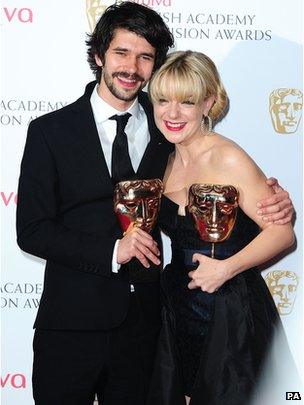
Ben Whishaw and Sheridan Smith were honoured
Olivia Colman's double win was the big story of the Bafta TV Awards, but who else was crying tears of joy and who went home empty-handed?
Here is a taste of what went on backstage at the Royal Festival Hall on London's South Bank.
After a damp start on a red carpet invaded by rain and Daleks, the first award of the night - best drama series - went to BBC One's Last Tango in Halifax.
The romantic drama starred Sir Derek Jacobi and Anne Reid as teenage sweethearts reunited 60 years later through Facebook. A second series is on the way.
The win was a predictable start to a Bafta night that proved to be full of snubs and surprises.
BBC Two's four-time nominated Hitchcock drama The Girl - starring nominees Toby Jones, Sienna Miller and Imelda Staunton - went home empty handed.
So did the channel's Edwardian period mini-series Parade's End.
But BBC Two did have plenty to celebrate. It converted 8 of its 26 nominations, winning more awards than any other channel.
Among its successes was last year's Shakespeare offering , The Hollow Crown, which triumphed in two performance categories.
Ben Whishaw won best leading actor for his performance as Richard II, while Simon Russell Beale's Falstaff in Henry IV Part 2 won him the supporting actor prize.
Moving drama
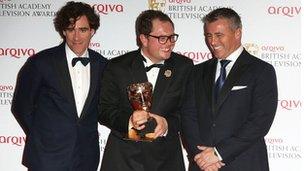
Alan Carr won best entertainment performance for his channel 4 show Alan Carr: Chatty Man
Speaking to the BBC backstage, Whishaw said he hoped to see more Shakespeare on TV.
"People seemed to be surprised they could follow it and were very moved by it, which is brilliant because maybe Shakespeare is still seen as the terrain of privileged group of people.
"Of course he didn't write plays for a few people - he was writing for mass audience, so I think it's very important that television touches on all the great literature in the world."
BBC Two's other victories included The Great British Bake Off, winning the features Bafta for the second year running, and Olympic-themed comedy Twenty Twelve.
The sitcom's creator John Morton revealed the show had not had an easy ride. "To begin with it was a small blip on the radar and for a while it wasn't deemed to be a good thing," he said.
Twenty Twelve also had to cope with the busy schedules of its stars such as Hugh Bonneville, who was also being chauffeured to film Downton Abbey at the same time.
One of Olivia Colman's two Bafta wins was for the role of Sally, the love-struck PA of Bonneville's character, Ian Fletcher.
So could the Twenty Twelve team ever get together on screen again?
"We are hoping that when the Olympics come back to London we will do that," said a straight-faced Jon Plowman, the show's executive producer.
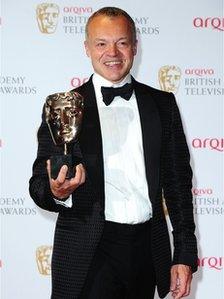
Host Graham Norton won best entertainment programme award for The Graham Norton Show
First time winners
Over at ITV Sheridan Smith and Alan Carr receive their first Baftas.
Smith is no stranger to awards, with two Oliviers already in her trophy cabinet, but the actress confessed she still suffers from a lack of self-confidence.
"I can't explain the self-doubt that I'm filled with daily," she admitted. "The Mrs Biggs lot were so supportive because I had melt-downs on set quite a lot. This [Bafta] has helped a bit."
Smith revealed she was due on set at 6am the next day - along with Olivia Colman - to film BBC romantic drama The 7.39, written by One Day author David Nicholls.
It wasn't clear if they would be taking their three Baftas to work with them.
In the entertainment performance category, Alan Carr beat last year's winner and ceremony host Graham Norton.
Among the more unpredictable winners were BBC Two's Murder and BBC Four's Room at the Top.
Murder, directed by The Killing's Birger Larsen, beat Everyday, The Girl and Richard II in the single drama category.
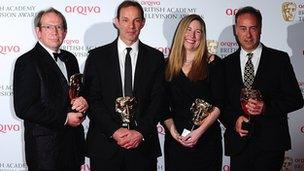
Twenty Twelve picked up best situation comedy
The production was notable for telling its story through confessional monologues delivered straight to the camera.
Meanwhile, Room at the Top - adapted from John Braine's novel of the same name - took the mini-series prize over Accused, Mrs Biggs and Parade's End.
With Matthew McNulty, Maxine Peake and Doctor Who's Jenna-Louise Coleman in the cast , the two-parter aired last September after it sat on the shelf due for more than a year due to contractual difficulties.
Speechless
Another surprise was that none of the BBC's Olympic coverage scooped the sport and live event prize.
The accolade went to Channel 4's coverage of the London 2012 Paralympics.
Presenter Ade Adepitan said he'd he'd seen evidence of the games' legacy at a recent wheelchair basketball event.
"We had an under-15 training session and 20 kids turned up," he said.
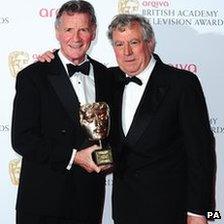
Michael Palin was presented with a Bafta fellowship by fellow Monty Python member Terry Jones
"When I was growing up and I wanted to play a Paralympic sport I kept it a secret - but these guys were pushing around with their chests out. They were proud to want to become Paralympians."
Another C4 success was the specialist factual win for All in the Best Possible Taste with Grayson Perry.
After his win, the artist joked: "I've got a Turner and Bafta - now I'm starting on my novel."
As for Olivia Colman, her two acting wins (for Twenty Twelve and Accused) left her tearfully struggling for words backstage.
"I'm a bit wobbly," she admitted. "I'm going to be your worst possible interviewee."
It won't be much of a surprise to see Colman back at the TV Baftas next year, if ITV murder mystery Broadchurch - in which she plays detective Ellie Miller - looms large in the nominations.
Meanwhile, the ubiquitous actress admits she'd be happy to spend "a couple of years" working in Hollywood if the offer came.
"Of course!" Colman cried. "It's warm and they pay better!"
- Published12 May 2013
- Published9 April 2013